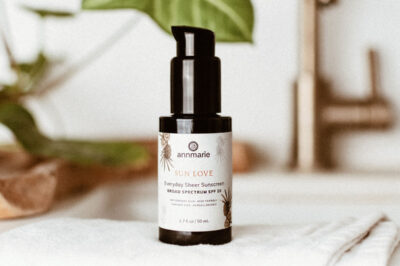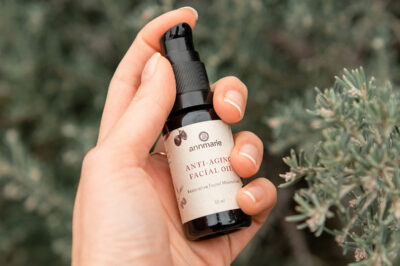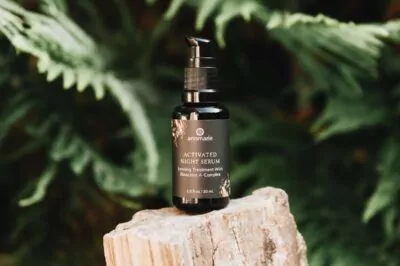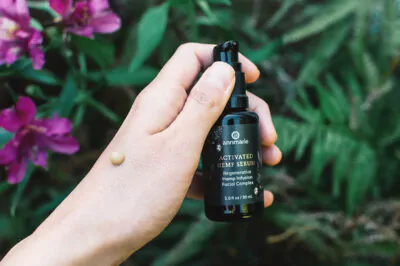Table of Contents[Hide][Show]
When looking for answers on how much our skin actually absorbs, there is a ton of varying information out there. While some sources say 60-70%, others say none at all.
The idea that your skin isn’t absorbing anything you put on it seems almost outlandish, but this myth exists for a reason and I wanted to get to the bottom of it, because there are some conflicting messages out there. It seems as though there is ample evidence that our skin is absorbing what we put on it, from transdermal medications, to studies that have found constituents like linalool in the bloodstream of people using lavender essential oil topically, to the children in Oakland that have tested high for lead in their bodies from polluted air and dirt.
Skin as an elimination system
When you think about it, our skin is an elimination system. We have over four million sweat glands and adults humans shed almost 9 pounds of skin every year on average. In relation to naturally occurring chemicals escaping our bodies through our skin, our bodies absolutely push toxins and toxic chemicals out through our skin—that’s part of it’s job!
We don’t consistently reuse the same hormones and chemicals internally and we’re continually producing and consuming more. So our skin, along with our liver, kidneys, and lungs, is always working to detoxify our bodies.
The difference between penetration and absorption
This is a really important distinction. Penetration is when a chemical makes it into the deeper layers of the skin, while absorption is when the chemical actually makes it into the bloodstream. These two terms are often used interchangeably, and that’s not correct.
While both things are important considerations when you’re choosing skin care products, absorption rate is really what we’re after here. Most chemicals, even if they can penetrate to the deepest levels of the skin, are too big to be absorbed directly into the bloodstream. So there’s the silver lining, right?
The Chemical Factors
The truth is, every chemical has a different absorption rate. To complicate that even further, some chemicals react on the body and make other chemical compounds more or less absorbable.
Ethanol (alcohol), for example, is a common additive in skin care products that increases absorption rates of other chemicals that are present—both because it breaks down the skin’s natural barriers, and because it pulls apart chemicals into individual constituents, so that they are small enough to absorb.
On the other hand, silicone additives, like dimethicone, sit on top of the skin and don’t allow anything to absorb. In fact, dimethicone is so adept at blocking absorption that it’s causing problems for aquatic animals that breathe and take in nutrients topically.
so, do entire products absorb into my skin?
It’s important to recognize that in most cases, it’s not going to be as simple as “I put lavender essential oil on my skin and lavender essential oil showed up in my bloodstream.” The environment and our bodies work to break down those larger products into many chemical components. If they are small enough to be absorbed, they will show up in the body as parts of the larger product, rather than the product as a whole.
variations between individuals
Additionally, humans aren’t one consistent chemical makeup, right? In general, everyone is made of organic matter and functions generally the same, but my precise chemical makeup is different than yours and yours is different than your best friend’s. This makes it a real challenge for scientists to do accurate studies on absorption rates and chemical reactions on the body.
Organic chemists have to make some generalizations about human chemistry when they’re creating a formula for topical medication, that’s why some people can use it and some suffer from serious irritation.
So Yes or No? Does our body absorb what we put on our skin?
Unfortunately, the answer is yes and no. We can most assuredly absorb things through our skin and into our bloodstream, but it’s not as simple as “60 to 70 percent of everything.”
Some things absolutely absorb right into our bodies, especially if there are other chemicals present that increase the absorption rate. That being said, most things don’t absorb directly into our bloodstreams through the skin, though they can often penetrate into the deeper layers of the skin.
check out information on specific chemicals
Because the jury is out on absorption rates in general, we definitely suggest researching penetration and absorption rates of any specific chemical or additive that you’re curious about. Even though there isn’t a black and white answer for this myth, it’s comforting to know that there is research out there that we can use to make informed decisions.
We stick to skin care products made with natural, organic ingredients to ensure that we are nourishing our skin and bodies, but we’re also happy to know we’re not blatantly absorbing everything we come into contact with.
What questions does this bring up for you? Let us know in the comments!
References:
“Can Cosmetics be absorbed into your Bloodstream?” Herb & Hedgerow. N.p., 06 July 2014. Web. 21 Feb. 2017.
DeBolt, David, and Katrina Cameron. “Oakland: Child lead exposure in Fruitvale worse than Flint, Michigan, study finds.” East Bay Times. East Bay Times, 29 Dec. 2016. Web. 21 Feb. 2017.
“Do Your skin care Products Get Absorbed Into Your Bloodstream?” Askanesthetician’s Blog. N.p., 30 Dec. 2013. Web. 21 Feb. 2017.
“The Impermeable Facts of Skin Penetration and Absorption.” Personal Care Truth or Scare. N.p., 18 Jan. 2011. Web. 21 Feb. 2017.
Olson, Samantha. “Guess How Many Gallons Of Tears, Sweat, And Saliva You Produce Each Year [VIDEO].” Medical Daily. N.p., 10 June 2014. Web. 21 Feb. 2017.
“Understand the importance your skin in your overall health.” Issels Integrative Immuno-Oncology. N.p., n.d. Web. 21 Feb. 2017.








Basically like the author stated everyone’s chemical formula is different and just that alone is enough to say that none of our questions can be answered truthfully for everyone. There is no correct answer for everyone. One chemical may absorb into person “A” at a rate of 2 mcg per hour when applied to the hands below the wrists and in person “B” it may be at a rate of 6 mcg per hour. Also factors such as what is currently on the skin? What condition is the skin in ? Is the skin damaged from excessive exposure to UV rays, what pollutants? What soaps? Facial cleansers has the person used whether or not they are absorbed. If they are residual on the skin they can very much be a factor in how another product will perform on your skin.
The next time you try a skin care product and it does not work for you as well as it seems to work on your friend(s) you must keep in mind that because every person is essentially too different in exacting chemical composition for any 1 product or even 10 products to work great on everyone. Products that people use that feel like they are working may in fact not be working at all. So maybe we should just leave it at a personal choice for what feels good to the individual. I would strongly recommend that people avoid the expensive products since you have just as good a chance with inexpensive products of finding one that will absorb into your skin. Or maybe you’re chemical ratios require an entirely different product first before anything can absorb into your skin.
So if dimethicone prevents absorption, why is it in so many face creams. Why pay 100$ for a Premium face cream and it’s just sitting there. Feels good but not doing anything. Lol. Must be an inexpensive filler. Makeup I get, we don’t want that absorbing into our skin. I personally break out if it gets anywhere near my skin. Sorry, starting to rant.
So how long does it take for an ingredient (generally speaking) to absorb into the bloodstream? I’ve heard 26 seconds but that doesn’t sound right.
I believe the information about 60-70% of ingredients being absorbed by our skin dates back to a study done in the American Journal of Public Health (Brown et al. 1984), which found that skin absorbed an average of 64% of certain chemicals, including VOC’s, found in drinking water. The study showed that some ingredients had an absorption rate of around 1%, while others were closer to 99%. If you’re interested in reading the study, it’s titled “The role of skin absorption as a route of exposure for volatile organic compounds (VOCs) in drinking water.” I’m a big advocate of simple beauty with minimal exposure to chemicals. Whether or not an ingredient is absorbed into the bloodstream, there’s sufficient information to suggest that there are hundreds of ingredients and derivatives that are linked to cancer, reproductive and endocrine disruption, organ toxicity, and at a pretty basic level – allergies. To be fair, there are natural ingredients can have similar effects, but my vote is always for safe, simple, products made with natural ingredients.
What are some of those natural ingredients that could have the same negative effects?